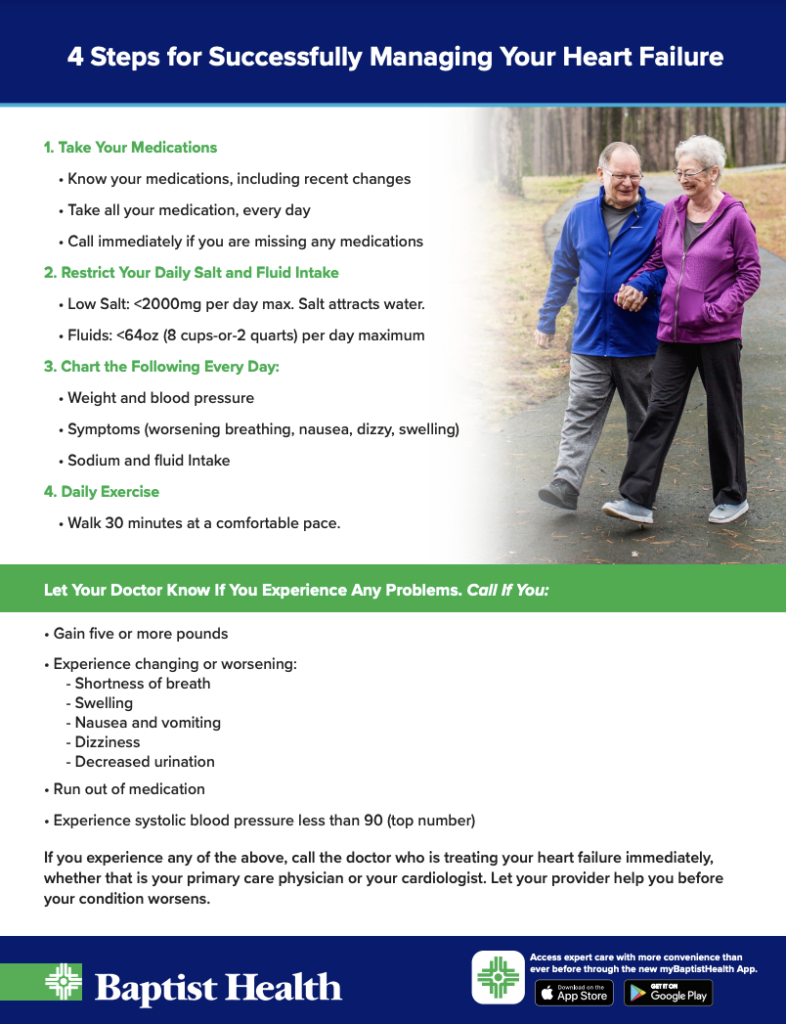Heart failure is a cardiac condition where the heart does not pump blood as efficiently as it should, resulting in a lack of oxygen and nutrients throughout the body. Though it affects people of all ages, heart failure is the leading cause of hospitalizations in people older than 65. Elderly patients who experience heart failure are likely to already have a chronic cardiovascular condition, but it can also be caused by physical decline due to aging and poor cardiovascular management throughout life. Other risk factors include obesity, a family history of heart failure, hypertension and diabetes.
Early signs of heart failure in the elderly are similar to those found in other age groups, which include worsening or shortness of breath, fatigue, bloating, lack of appetite, persistent cough, lack of appetite and nausea. Other symptoms may include a mental decline or depression.
Heart Failure Management in the Elderly
Managing heart failure in the elderly starts by following four basic treatment guidelines, which you can easily remember through the acronym MICE (Medication, Intake, Charting, Exercise).
Medication
Faithfully take prescribed medication. Prescriptions should be refilled immediately to avoid missing a dose. If medication is needed and a patient is unable to get a refill for some reason, call your physician immediately.
Intake
Sodium and liquid intake should be limited according to your physician’s specifications. Typically, it is suggested heart failure patients consume less than 2000 mg of sodium a day, and less than 64 oz. of fluids a day.
Charting
Blood pressure and weight should be charted daily to closely monitor cardiac health. These charts should be brought to every doctor’s appointment.
Exercise
Exercise is essential to keeping the heart healthy. Heart failure patients should be active every single day while being careful not to overexert themselves. Walking is often an effective form of exercise for seniors with heart failure, but those who want a more customized plan can find it through the cardiac rehabilitation program at Baptist Health.
Heart Failure Treatment Options for the Elderly
Heart failure is always treated with a combination of medication and lifestyle changes, but some elderly heart failure patients may benefit from a cardiac rehabilitation program, particularly if they’ve experienced a cardiac event such as a heart attack.
Surgical options for older people with heart failure can be limited. For example, most elderly patients aren’t considered good candidates for heart transplants, as the cutoff to receive a heart transplant is age 70. However, a surgically-implanted left ventricular assist device, or LVAD, can be an option for elderly heart failure patients into their 80s. The LVAD is an implantable mechanical pump that pumps blood from the lower chambers of your heart (the ventricles) to the rest of your body. This often improves heart failure, and in some cases, reverses it altogether.
How to Help an Elderly Loved One with Heart Failure
If one of your elderly friends or family members is living with heart failure, you can support them as they manage their disease by doing the following:
- Attend appointments.
- Help with regular charting.
- Stay educated on your loved one’s condition by asking plenty of questions during checkups.
- Watch for drug interactions, especially if any prescription dosages are changed or new medications are introduced.
- Visit your loved one frequently enough to notice increases and decreases in activity, swelling, fluid intake and mental health, along with any other changes.
- Report any changes to the physician.
Heart failure in the elderly presents a range of challenges – but you don’t have to face them alone. At the Baptist Health Heart Failure and Transplant Institute, we offer unmatched seamless, comprehensive care for those with heart failure. If you need support for yourself or a loved one with the condition, learn more about living with heart failure or download our guide on managing heart failure.


